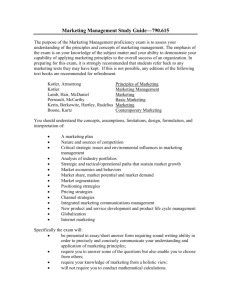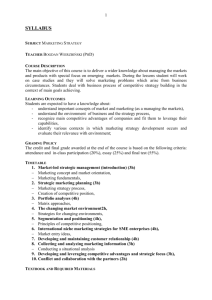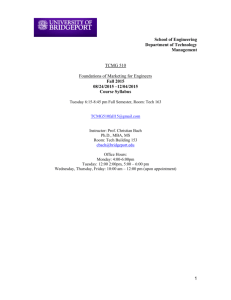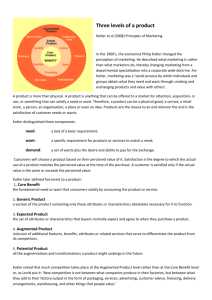school of business administration
advertisement
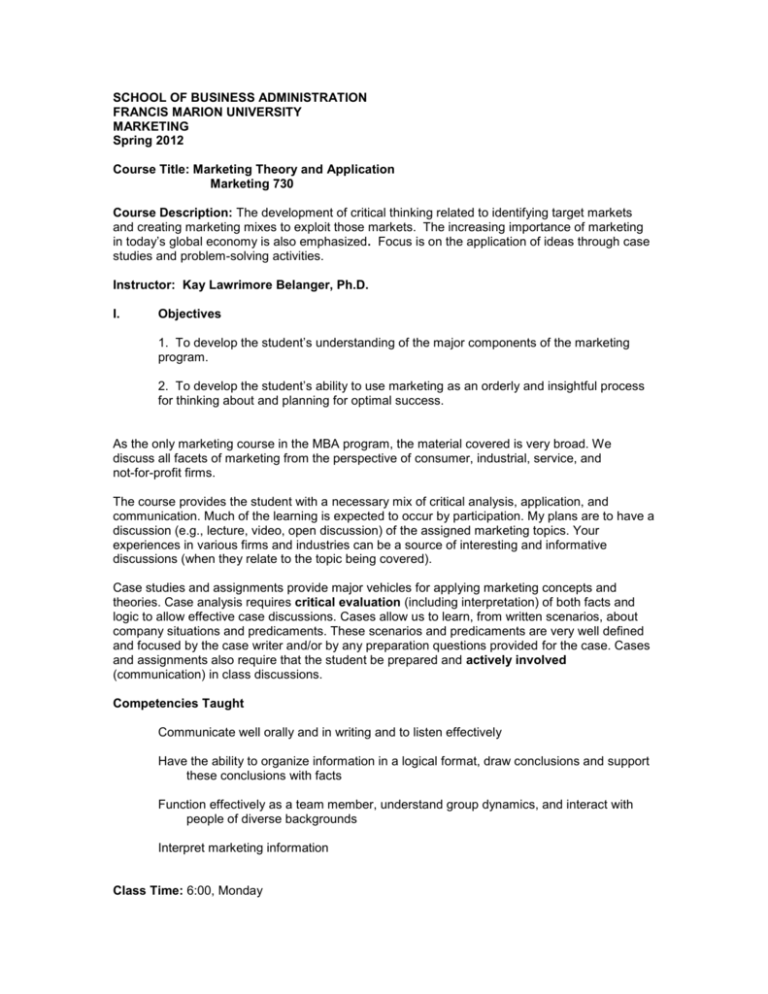
SCHOOL OF BUSINESS ADMINISTRATION FRANCIS MARION UNIVERSITY MARKETING Spring 2012 Course Title: Marketing Theory and Application Marketing 730 Course Description: The development of critical thinking related to identifying target markets and creating marketing mixes to exploit those markets. The increasing importance of marketing in today’s global economy is also emphasized. Focus is on the application of ideas through case studies and problem-solving activities. Instructor: Kay Lawrimore Belanger, Ph.D. I. Objectives 1. To develop the student’s understanding of the major components of the marketing program. 2. To develop the student’s ability to use marketing as an orderly and insightful process for thinking about and planning for optimal success. As the only marketing course in the MBA program, the material covered is very broad. We discuss all facets of marketing from the perspective of consumer, industrial, service, and not-for-profit firms. The course provides the student with a necessary mix of critical analysis, application, and communication. Much of the learning is expected to occur by participation. My plans are to have a discussion (e.g., lecture, video, open discussion) of the assigned marketing topics. Your experiences in various firms and industries can be a source of interesting and informative discussions (when they relate to the topic being covered). Case studies and assignments provide major vehicles for applying marketing concepts and theories. Case analysis requires critical evaluation (including interpretation) of both facts and logic to allow effective case discussions. Cases allow us to learn, from written scenarios, about company situations and predicaments. These scenarios and predicaments are very well defined and focused by the case writer and/or by any preparation questions provided for the case. Cases and assignments also require that the student be prepared and actively involved (communication) in class discussions. Competencies Taught Communicate well orally and in writing and to listen effectively Have the ability to organize information in a logical format, draw conclusions and support these conclusions with facts Function effectively as a team member, understand group dynamics, and interact with people of diverse backgrounds Interpret marketing information Class Time: 6:00, Monday Telephone: 661-1424 E-mail: klawrimore@fmarion.edu (office) Office Hours: Posted by office door Office hours includes Monday: 4:00 – 6:00pm, 9:00-9:30 pm TEXT Required: Marketing Management Kotler and Keller Prentice Hall Many texts are available which provide additional examples, explanations of concepts and insights to marketing theory. ATTENDANCE Students are required to follow the University’s attendance policy. A student whose absences exceed those designated in the university catalogue may be dropped from the course. For this course more than 1 absence may result in the student being dropped from the course. EVALUATION Examination I Examination 2 Major project written and oral presentations Class Participation Written Cases/Assignments 35% of final grade 30% of final grade 10% of final grade 25% of final grade Two exams are scheduled for the semester. The higher of the two grades will be account as 35% of the final grade. The final exam will be comprehensive. CLASS POLICIES AND NOTES 1. No make-up exams. 2. NO CREDIT will be awarded for exercises/assignments TURNED IN LATE. A written copy of the assignment is due at the beginning of each class. All electronic submission must have a hard copy submitted during class. 3. Full credit will not be automatic on homework assignments turned in for points. NEATNESS, CLARITY, COMPLETENESS AND PROFESSIONALISM will be considered. Homework assignments turned in prepared in a manner that exhibit a lack of reasonable care will not receive full credit. 4. Questions, Exercises,Cases, and Projects may be answered/solved by two or more students outside class; however, each student is individually responsible for in-class participation and the submission of the final answers. 5. Due to the large amount and complex material we cover in a relative short period, class time is not sufficient to allow mastery of the subject matter. In planning your schedule, allow approximately four to six hours of study time for each class meeting. 6. Attend class. 7. The assignments provide only the minimum work necessary to comprehend the subject matter. 8. Please do not eat in class. You may quietly drink any legal beverage permitted on campus. 9. Students who arrive after class has begun, disrupt those students who have arranged their schedules to arrive timely. Do not disrupt class, PLEASE. 10. The final major project will require an oral group presentation and a written report. Students will be required to be in a group of four and may form their groups. There will be one group of three members. 11. Several on-line meetings have been scheduled for the semester. You are requested to have access to the internet and a microphone. A camera is also requested. Class Participation Class participation is an important element of case discussions. Learning depends heavily upon thorough and lively participation. The primary emphasis should be on quality participation, not quantity. The quality of participation, as reflected in careful reading of cases and assigned material, thoughtful reflection, and clear and concise comments, is extremely important. However, one cannot make quality contributions without some quantity. It is particularly important that your comments fit into and build on previous comments. This requires that we all listen carefully to each other. Class participation will be judged on the basis of quality and consistency of effort on a daily basis. Attendance is not participation. Each student can ascertain the adequacy of her/his participation by occasional discussion with the instructor. However, careful self-monitoring using the following criteria for effective classroom participation may be useful: Do comments generate discussion, or do they tend to be ignored by others? Do others appear confused when the participant makes a point? Are others left with a "so-what" feeling, or does the discussant reach a conclusion that is clearly understood and appreciated? Do comments develop on evidence from the assignment, or do they just relate what everyone already knows? Are participants able to clarify important aspects of previous comments and relate them to the problems and topics under discussion? Do comments distinguish among different kinds of data - facts, opinions, beliefs, theories - in their construction? You are to be prepared (actively involved) for every class. Since I frequently call on individuals even when their hands are not raised, you should let me know before the start of class if some emergency has made it impossible for you to be prepared adequately for that class. Naturally, there are students who do not feel comfortable participating verbally in the classroom. We should all try to make the classroom atmosphere as congenial as possible to assist all of our colleagues in the participation process. Students are encouraged to meet regularly outside of class to discuss assignments (except individual ones) before the scheduled class activity. Missed classes could affect (severely) your performance in the class. There is no way to make up "missed" participation opportunities. Written Assignments: Written assignments do not need paragraph form (essays), but may use bullets and short sentences with headings. It must be typed. You are writing for a busy top executive. The write-up often requires the use of theory to support your opinion. Semester Case The case will be assigned by the third class period and requires the development of a marketing plan. Students will be required to work in teams of four to answer and present the information. The final presentation of the case will be the last scheduled class. This case will not be specifically discussed in class. Students are in competition. Application Assignments An important part of learning is the ability to transfer concepts and thought structures from one frame of reference to another. To achieve that level of learning, the Application Assignments ask students to individually apply concepts from the course to a specific business setting/question. These papers will provide the basis for part of our classroom discussion on the days of their submission. Assignments will be posted to blackboard and/or distributed in class. Your paper should not exceed two pages, unless specified otherwise (1.5 spaced, 12 point Arial type, one inch margins around). You may craft the paper in outline/bullet point form or in prose (i.e., paragraph) form depending on the need and your preference. It should reflect your ideas applied to the specific issues within the assignment. References must be provided as required. Be prepared to discuss your findings in class. The value of each application assignment will be posted with the assignment. In general, if you provide a paper that is interesting, holds value, and is appropriate you should receive all or a majority of the points. However, papers that are off target, do not effectively address the issues posed, has a grammar error or are incomplete will not receive a majority of the points. Generally, the assignments will be graded using the following: U: not satisfactory (indicates an inadequate response) 70 S: a response that is typical of a student enrolled in the MBA program E: the response indicates thought and linkage of information 90+ 85 Remember that the course also contains an evaluation component for class participation. Certainly, you will want to take advantage of the opportunity to fully contribute to the discussion of your application papers on the days they are due. Papers are due by email to klawrimore@fmarion.edu by 3:00 on the date the particular Application Assignment is scheduled. Subject lines should have your name and the Application Assignment title. These are individual papers. Please do not work on preparing them with other students. Objectives for class with reading assignments. January 23 Demonstrate the role market orientation plays in building marketing strategies that deliver above-average levels of customer satisfaction and profitability. Make clear that the market orientation of a business is only as strong as the collective marketing strength of the individuals who make up a management team, and that businesses with strong market orientations have a market-based management culture that ensures both employee and customer satisfaction. Introduce the difference between transaction marketing and relationship marketing Illustrate the impediments to developing a marketing orientation Illustrate how a market-based business continues to reengineer itself around markets as customer needs and competition change and new market opportunities emerge. Kotler and Keller: Defining Marketing (ch 1) Managing a Holistic Marketing Organization (ch 22) 30 Continuation of previous class objectives Articles: Rethinking Marketing Harvard Business Review January–February 2010 Silo Busting: How to Execute on the Promise of Customer Focus Harvard Business Review May 2007 Unleashing the Power of Marketing Harvard Business Review October 2010 1/30 Application Assignment to be submitted prior to 3:00 pm on 1/30 February 6 Introduce the importance of environmental forces in affecting the relationship among the firm, suppliers, customers, and competitors Kotler and Keller: topic: Macroenvironment (ch 3) Demonstrate the importance of predicting, and responding to the macro environment 2/6 Application Assignment to be submitted prior to 3:00pm on 2/6 Be prepared to present orally (5 minutes) Discuss the range of options for conducting research Introduce the concept of marketing metrics Delineate the difference between market demand and market potential Kotler and Keller: Gathering Information (ch 3) Conducting Marketing Research (ch 4) Article: Managing the Marketing Metrics Portfollio, Marketing Management< Fall 2011 13 online Continuation of previous class objectives Present the concept of customer value and satisfaction and the different ways customer value is measured. Discuss the importance of customer relationships Discuss the range of programs that can be developed under customer relationship marketing and when each would be appropriate in creating both higher levels of customer value and business profitability Discuss the roles played by individuals and the critical elements in the purchase decision process Kotler and Keller: Creating Customer Value, Satisfaction and Loyalty (ch 5) Analyzing Consumer Markets (ch 6) Analyzing Business Markets (ch 7) Article: The Right Way to Manage Unprofitable Customers Harvard Business Review October 2008 20 online Continuation of previous class objectives Discuss the importance of market segmentation and its role in the development of meaningful marketing strategies. Discuss the various segmentation strategies and when a business might pursue one type of segmentation strategy over another. Kotler and Keller: Identifying Market Segments and Targets (ch 8) Demonstrate the importance of building, measuring and managing brand equity Discuss product positioning, alternative positioning strategies, and the positioning factors that need to be addressed in developing a successful product positioning strategy. Present the role of product line positioning and product line extension strategies. Kotler and Keller: Creating Brand Equity (ch 9) Brand Positioning (ch 10) Product Strategy (ch 12) Article: Branding in the Digital Age Harvard Business Review, December 2010 27 Continuation of previous class objectives The importance of gaining insight and dealing with competition Present competitor analysis tools that can be used to better understand the competitive position of a product or business. Discuss the various sources of competitive advantage and the factors that shape a particular source of competitive advantage Kotler and Keller: Competition (ch 11) Demonstrate the importance of service design and management Kotler and Keller: Services (ch 13) 2/27 Application Assignment to be submitted prior to 3:00 on 2/27 March 5 online 12 19 26 April 2 online Continuation of previous class objectives Present the difference between cost-based pricing and value-based pricing and the role pricing plays in product positioning. Demonstrate the importance of price elasticity and cross elasticities in developing product line pricing strategies. Demonstrate the impact of pricing promotions on customers, intermediaries, and business revenues and Profits. Kotler and Keller: Pricing Strategies (ch 14) Spring break Exam 1 Present the importance of marketing channels in creating customer value, reaching customers, and lowering marketing costs. Review the various marketing channels with a special emphasis on emarketing as a marketing channel. Kotler and Keller: Integrated Marketing Channels (ch 15) Demonstrate the role that marketing communications play in building higher levels of customer response and market share. Present marketing communications strategies that could be used to increase awareness, sustain message retention, and stimulate customer action. Discuss the various kinds of push and pull marketing communications and how to evaluate the profit impact of alternative marketing communications strategies Kotler and Keller: Integrated Marketing Communications (ch 17) Mass and Personal Communications (ch 18, ch 19) Demonstrate the need for both offensive and defensive strategic marketing plans with respect to achieving short- and long-run performance objectives in the areas of market share, revenue growth, and profits Present and discuss each of the defensive marketing strategies and how they are managed strategically to contribute to both short- and longrun performance objectives 9 Team meeting 6:00 – 8:00 Class 8:00 each team must submit to instructor a draft report of project 16 23 Students demonstrate knowledge and understanding of marketing Students demonstrate knowledge and understanding of marketing 30 Final exam
